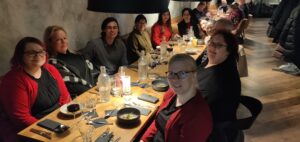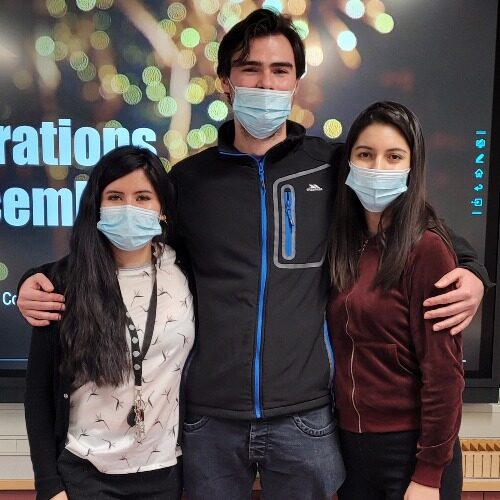
The project is funded by the Finnish National Board of Education.
From School to Global Citizen’s Highway II project continues our previous project which was concluded in December 2021. This project focuses on language awareness and internationalization. The project is funded by the Finnish National Board of Education. The co-ordinators of the project are three language teachers at the UEF Teacher Training School, Hanna-Mari Koistinen, Elina Ukkonen and Noora-Liia Rautio.
-
The European Day of Languages (EDL) has been celebrated on 26th of September since 2001. This annual celebration was initiated by the the Council of Europe to raise awareness of the linguistic diversity in Europe and to encourage the citizens of the European Union to study more languages.
European Day of Languages 2021
This year the European Day of Languages fell on a Sunday, but it was celebrated in both Tulliportti teacher training school and Rantakylä teacher training school on Friday the 24th and Monday the 27th. On those days pupils got a chance to visit different workstations where they could try language-related activities and check them off in their language passports. The official website for the EDL, which has a lot of materials and ideas for events, served as a source of inspiration in planning the activities: https://edl.ecml.at/Home/tabid/1455/language/en-GB/Default.aspx
The language passport that we used in our event was based on the secret agents language challenges presented on the website.
The workstations were planned and materials were prepared by UEF master students in the Early Language Learning for Intercultural Communication programme. Also a few English teacher trainees were instructing pupils at the stations. During the day pupils had a chance, for instance, to get to know jokes in different languages, test tongue twisters, solve riddles, take a language quiz, learn Chinese sign language and Japanese characters, learn numbers and greetings in different languages and sing karaoke.
In Rantakylä school there was also a library stall where Katri Pesonen from Vaara libraries had set out a collection of foreign language books for pupils to browse and to inspire them to borrow the books from the pop-up library that runs at the school.
In this language event pupils had a chance to get in touch with different languages, learn new words and to reflect on their language skills. How many languages can I speak? How many different languages do I recognise? The pupils got to take the language passports at home and were encouraged to try out more language activities in the coming weeks. Those who completed at least ten activities in their passport had a chance to win a small prize.
At Tulliportti school the pupils in grades form 7th to 9th got to explore European languages and test some language challenges in the lessons. At the same time teachers of different subjects became aware of the European Day of Languages. Maybe the adults of the school got also inspired to think about their language skills? Language learning is for everyone!
Elina Ukkonen






European Day of Languages 2022
This year on the European Day of Languages pupils had a chance to take part in language challenges that were planned and chosen by teacher trainees. The challenges included learning greetings and tongue twisters in different languages, taking a quiz on European countries and languages, planning a trip of their dreams and telling jokes. Those who completed a challenge could take part in a competition to win a language-themed prize. In Tulliportti school one 9th grader completed all the challenges! According to him, the challenges were fun to do because “Otherwise I didn’t have anything to do during the break!”. This tells us that optional activities like these bring a refreshing change to everyday routines.
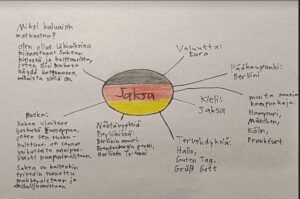
Hanna-Mari Koistinen ja Elina Ukkonen
-
Juan
Juan Antonio Pérez comes from Spain, he is 24 years old, and he is currently studying a Master’s in Environmental Policy and Law at the University of Eastern Finland. He was very motivated about the role of teaching at this club, where he could show everything that he had learnt after living in 5 different countries. Here is what he says:
“It was great to have the opportunity of working at both schools during my time in Finland. It has been very enriching, and I have learned so much from the students. I never imagined that I would be teaching at a Finnish school before, but life takes you to places that you would never imagine! Education is such a powerful tool, and I am sure that this project has had an enormous impact on all the students, who will now see the world and others with different eyes. I will never forget this experience.”
Balazs
Balazs Hergert comes from Hungary, he is 27 years old, and he is currently doing a Master’s in English language and culture at the University of Eastern Finland. He was incredibly happy to embrace the opportunity of instructing the club since he would like to continue working as a teacher in the future, and this role was a very colorful learning experience for him. Here is what he says:
“It was amazing to work with people from different backgrounds, so I am very thankful that I got selected by Jenny and Iris in the first place. In the past year, we were working together in a team of five, including Jenny, Iris, Juanan, Fernanda and me, and coming from different international backgrounds always generated interesting discussions on the meetings where we all shared the workload and created the activities together, bringing ideas from our own experience and expertise. This year, we took this role on together with Juanan as a team of two, and I believe that we did an excellent job in sharing stimulating ideas with students about languages, cultures, and such issues that we must face in the 21st century on a global scale.”
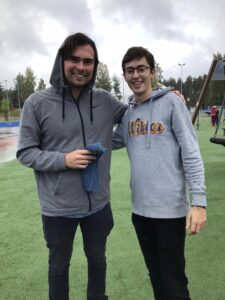
Balazs Hergert and Juan Antonio Pérez
-
In August and September 2021, Peruvian Fernanda, a former ELEIC student, worked as an assistant teacher for three weeks at Rantakylä teacher training school. She planned and taught short sessions for pupils, helped teachers and pupils during English lessons by discussing and making materials. During lessons, Fernanda taught the pupils about llamas, potatoes and Montaña de 7 colores mountain. In addition, one of her work assignments was to discuss with teachers in the teachers’ lounge. Talking with Fernanda was a meaningful and important possibility to use English in an authentic situation. Second-graders especially enjoyed working with Fernanda and were dissapointed when she left to continue her studies at the university.
https://www.peru.travel/en/masperu/vinicunca-the-beautiful-mountain-of-seven-colors
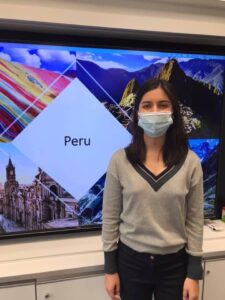
Swiss Anja, also a former Early Language Education in Intercultural Communication (ELEIC) student, worked as an assistant teacher at both Rantakylä and Tulliportti teacher training schools in November 2021. At Rantakylä the eighth-graders started their Switzerland theme with her and they heard authentic examples of Swiss German. Anja also planned and taught sessions to pupils, and her sessions included themes such as asking and giving directions, Sechseläuten fest in Zurich, CERN (the European Organization for Nuclear Research), St. Nikolaus and Christmas. A great thing about having Anja as an assistant teacher, was that the German teachers at both schools also learnt new things about Switzerland.
https://www.zuerich.com/de/besuchen/sechselaeuten
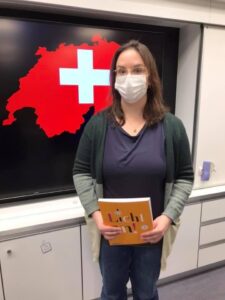
Sari Parkkinen, Hanna-Mari Koistinen
-
From School Path to Global Citizen’s Highway I –project launched international clubs in Tulliportti teacher training school in the school year 2020 – 2021. In this second part of the project the clubs were introduced also to Rantakylä teacher training school and continued at Tulliportti school. Five international UEF students Iris Hubbard (the USA), Jenny Torroledo Castillo (Colombia), Balazs Hergert (Hungary), Juan Antionio Perez Lopez (Spain) and Fernanda Alfaro Chavez (Peru) work as club teachers. Jenny and Iris ran the clubs also last year and are now tutoring the new club teachers.
The goal of the clubs is to introduce pupils the themes of global citizenship and help them grow as citizens of the world. In addition to different languages and cultures, the activities in the clubs revolve around UNESCO themes. Also, the interests and wishes of the pupils have been taken into account when planning the club meetings. Unfortunately covid-19 pandemic interfered with the clubs so that some club meetings had to be cancelled during the acute phase of the pandemic. Luckily, when moving on to the spring term the clubs were able to run normally in both school.
Below is Iris’s description of the club programme.
Hanna-Mari Koistinen and Elina Ukkonen
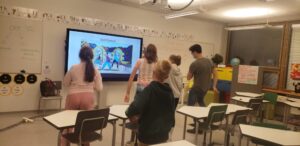
This fall, students have been exploring and working towards a global citizenship mentality. The activities were created based on UNESCO topics and learning objectives, and the students’ needs, interests and potential.
Week 1:
We started by learning about each other. We wanted students to share not only about themselves but also about their community and country. In this week, we also shared from the teachers’ countries by sharing pictures, finding differences and similarities with Finland, and dancing to some famous songs from around the world.
Week 2:
Building off the previous week’s theme, we continued learning about cultural diversity around the world. Students identified and discussed stereotypes about people from different cultures and nationalities. Then, they shared what they learned in the form of drawing and writing.
Week 3:
We transitioned to the theme of environmental issues related to global water pollution. Students created puppets of their favorite marine animals and then reflected on how the animals would feel and/or be impacted by an oil spill. To conclude, students attempted to brainstorm solutions to effectively cleaning up future oil spills and preventing them in the first place.
Week 4:
This week’s theme was gratitude. Students shared how they can express gratitude and different styles of communication. Next, we baked a cake without speaking but instead by using other collaborative communication skills. The session ended with students representing their gratitude visually.
Week 5:
This next theme was related to respecting our planet Earth and representation in space. We discussed that while there has been some talk recently in the news about traveling to Mars, we emphasized the importance of taking care of our home planet first. This connected to our previous week’s topic of water pollution but we expanded that to include plastic pollution. Finally, students made space inspired clay lanterns with stars and moons to show gender representation in space.
Week 6:
In the next week, art was the main topic. Students discussed what art means to them and shared different ways to express themselves. They explored different art styles including dot art, poetry and origami. Finally, we discussed that anything can be art, and beauty like art can be viewed differently by each person.
Week 7:
During the final week, we talked about how seasons can be different around the world even during the same month such as December. Students explored how people spend their time recreationally in Brazil and compared it to the activities people enjoy in Finland. The main aim was to develop intercultural understanding. In addition, students baked a traditional Finnish treat, joulutorttu, and made origami snowflakes.Iris Hubbard
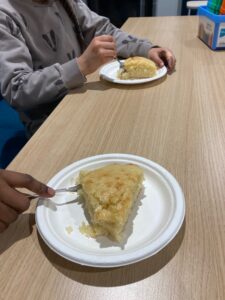
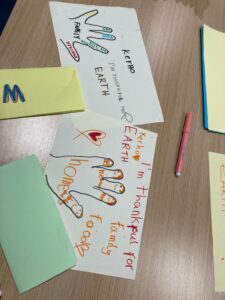
Find club lesson plans and resources here.
Students of the World clubs at Rantakylä and Tulliportti Teacher Training Schools (from 2021 to 2022).
Balázs and Juan have also been the teachers of the “Students of the world” afternoon club, and they have been coming to both schools at Rantakylä and Lansikatu every week. Together with the students, they learnt about the environment and climate change, art, dis(abilities), and languages, among other topics. The activities were very diverse and included crafts, drawing, cooking, dancing… and of course, practicing English!
Introductions
In the first week, we had an introduction session where we introduced ourselves to the students and then played a human bingo activity, in which students had to walk around asking questions from each other to fill in the bingo paper. Then each student received a paper to write what best represents them in a few words, and drawing. This was followed by dancing games.
Environment
This lesson was dedicated to climate change, and we learnt about CO2 with a bottle experiment involving a mixture of baking soda and vinegar and a balloon which blew up on top of the bottle due to the generated CO2 inside. We also created a jellyfish craft to celebrate jellyfish day, and we reflected on the fact that more jelly fish can be seen at coastal areas due to increasing sea temperature.
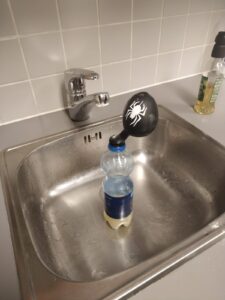
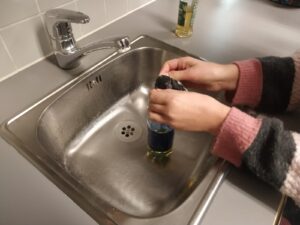
Food Waste
In this lesson, we introduced problems arising from wasting food around the world and discussed how to solve them in the household. The second part of the lesson was an acting activity where we staged ways of dealing with food in the house, one which produced waste, the other which was more sustainable.
Art
In this lesson, we talked about types of art, and discussed with students what their favorite art genres are. Then we introduced art from our own culture, presented paintings and folk traditions from both Spain and Hungary. This was followed by a craft activity that was made using the colours of the rainbow on a piece of paper on which later students scratched different shapes and creative forms.
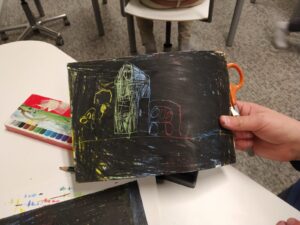
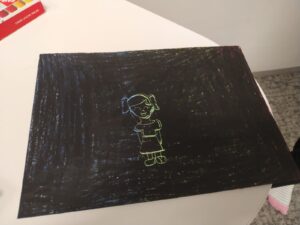
Inequality
In this lesson, we talked about global income inequalities motivated by the fact that just recently Earth reached a population of 8 billion people. This included a discussion on the lack of technology and internet connection in developing countries, and unequal wealth distribution. We also created an activity to demonstrate to students how inequality affects the population and represented with a game including diverse ways of sitting on available chairs.
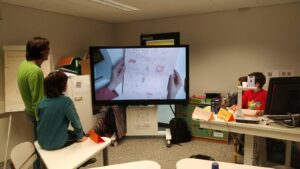
Baking Ghana shortbread + languages quiz
In this session, the students from Ghana recommended to bake a shortbread that is typically made in their family. While we were baking, we also showed a Kahoot quiz to students about the diversity and relatedness of languages.
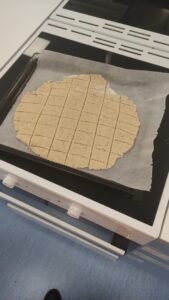
(Dis)ability
In this lesson, we introduced sign language and braille writing to students. The students learnt valuable information and awareness about people with disabilities, and how sign language developed and evolved. They also grasped the alphabet and a few gestures in ASL sign language. What is more, they learnt to write their names in Braille as well.
Cooking peanut brittle and final reflection activity
In the final lesson, we baked peanut brittle, which was also recommended by the students, and created a game that reflected on the whole club for this semester. This was a board game adapted with questions concerning the club and what they had learnt during the lessons. The students ate the peanut brittle at the end, and we finished playing the board game together.
Juan Antonio Perez Lopes and Balazs Hergert
-
This academic year 2021-2022 our club teachers Jenny, Iris, Fernanda, Balasz and Juan have planned and organized pop up events and other multi-sensory and co-operative activities during recesses for lower comprehensive pupils at Rantakylä and Tulliportti teacher training schools. The themes of the events and activities have been similar to those of the clubs. Pupils have had the opportunity to communicate in foreign languages, explore and develop their global citizen skills. We will continue organizing recess activities in fall 2022!
Winter Olympics
The Winter Olympics was a large-scale pop-up event organized for the two teacher training schools, Tulliportin normaalikoulu and Rantakylä normaalikoulu. The event was divided in two days, with the supervision of three interns in each day. The first day students participated in an obstacle course, that aimed to resemble a triathlon. The obstacle course had three stations, in which students had to answer questions related to the winter Olympics; these questions included topics such as facts, sustainability, risks, advantages, and gender equality. From the first station, students had to run, then they had to throw a hula-hoop and finally, they climbed. During the second day, students participated in three stations as well; the first one was hockey, the second one was curling, and the third one was a snowman building activity.
Below you will find some pictures of the event. Students seemed interested and engaged in the activities.
Jenny Torroledo Castillo and Iris Hubbard
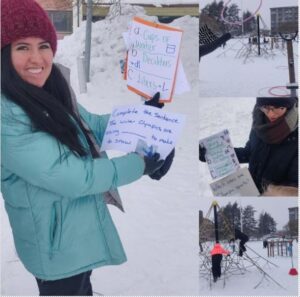
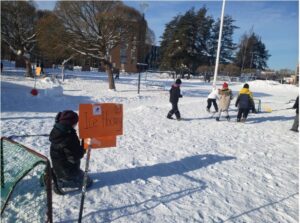
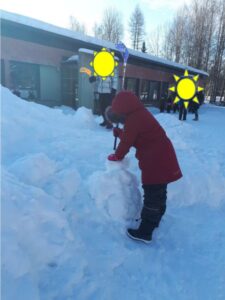
-
In May 2021 we organized a pop up day in the theme of global citizenship for comprehensive school pupils at both Tulliportti and Rantakylä teacher training schools. Our club teachers Iris, Jenny, Balasz and Juan planned and organizes three multidisciplinary workshops appropriate for different age groups. Pupils picked one or two of these workshops according to their timetables.
Jenny and Juan’s Hola España y Colombia workshop concentrated on the club teachers’ home countries, cultures and mother tongues. In addition, pupils got to test the traditional Colombian Rana coin toss game. Balasz was in charge of the Language Tasting workshop in which the pupils studied the similarities of languages, Chinese characters and hieroglyphs by playing games and crafting. Also, Balasz taught our pupils Hungarian, which the pupils found had many similarities with the Finnish language! Iris set up a card making and letter writing workshop, which also gave the pupils some insight into the life of a refugee. At Rantakylä school, this workshop was run in co-operation with the JoMoni organization. The letters were given to Ukrainian refugees through the Finnish Red Cross.
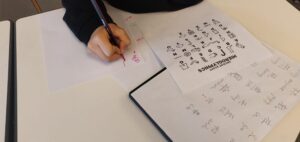
In addition to the club teachers’ workshops, us project co-ordinators Hanna-Mari, Elina and Hanna organized our own workshops at our schools. At Rantakylä school, second and third-graders familiarized themselves with the UN children’s rights by watching a UNICEF video and playing a game called Know Your Rights. At Tulliportti lower comprehensive school, pupils played UNICEF Moksha Patamu game, discussed human rights, did a relaxation activity and painted their dream place for relaxation. At Tulliportti and Rantakylä higher comprehensive, pupils were introduced the topic of antiracism, which was set up by the city of Joensuu and RanKids. In this workshop pupils heard a story of a Iraqi refugee and deal with the theme by creating poems. Another workshop was organized with the help of All Our Children organization for Rantakylä higher comprehensive school pupils. It included themes of EU values and human rights.
Check out UNICEF human rights and global citizenship materials from here https://www.unicef.fi/koulut/materiaalit-opettajille/
This pop up day was a success!
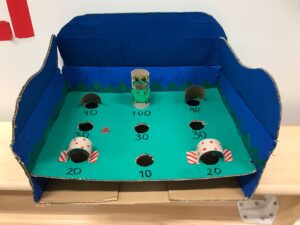
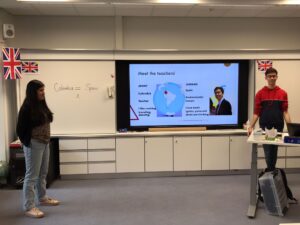
Hanna Hotanen, Hanna-Mari Koistinen ja Elina Ukkonen
Games of the World – Recesses 2022
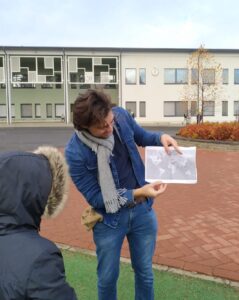
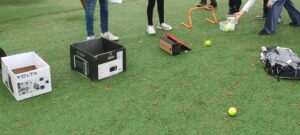
In the first five weeks of the project this semester we created outdoor activities to be played during the recess period. The activities were based on international outdoor games that we selected for each recess. Among these games, we included El Panuelo (Spain), a competitive running team game, a variety of throwing games, such as Frisbee Golf with hula-hoop scores (Canada), Ring Toss (UK) and game that involved throwing objects for different target scores. Other activities included a categories game (US) in which students were playing in a circle and threw the ball to each other and on receiving the ball they had to say a word in a selected category otherwise they were eliminated.
Thus, the kids from 2nd to 6th grade had the possibility of discovering games that other children play in countries. Balázs and Juan also brought a map of the world and the students learnt to locate themselves and the countries on the globe, getting a step closer to becoming global citizens.
Recess games examples:
- El Panuelo (Spain)
- International word sandwich
- Frisbee golf with hula-hoop and with cones (Canada)
- Ring toss (medieval Britain)
- Tennis ball bowling
- Shooting for scores on paper plates
- Categories ball game (US)
Juan and Balazs
-
Elina and I travelled to Helsinki to a meeting for international projects at the National Board of Education in Helsinki in August 2022. At the meeting, we got ideas for future projects, networked and listened to interesting presentations. Marja Tamm from University of Helsinki and Riikka Jalonen from Peace Education Institute brought new viewpoints to peace education and Tiina Sarisalmi from Orivesi to involving pupils and students in projects. Nina Eskola explained the steps of working on a project throroughly and Katariina Petäjäniemi on the current news of the National Board of Education.
Thank you all for a productive day!
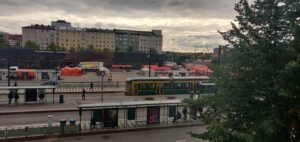
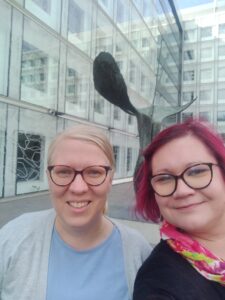
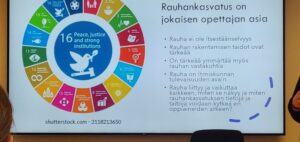
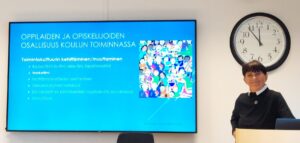
Photo permissions asked.
Hanna-Mari Koistinen
-
Find materials here.
-
National Board of Education Internationality Days 2022 in Joensuu
This year Internationality Days were organized in Joensuu on the 10th and 11th of November.
The days included a variety of workshops as well as lectures, a theatre play and pupils’ viewpoints on the importance of crosscultural communication. Growing up as a global citizen, internationality, crosscultural communication and the ways of carrying out international and global citizenship projects were the themes of all activities, lectures and other performances
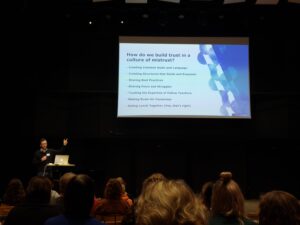
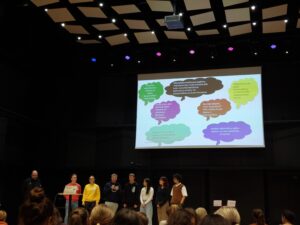
Elina Ukkonen and I attended the two-day-long seminar and wokshop days with eager minds. The workshops we selected dealt with these topics:
- democratic involvement of the pupils
- using play and drama in peace education
- using Thinglink to create virtual trips
- languge Profile in Upper Secondary School
- getting to know and appreciating others through a global citizenship material called Hiphei! Kasvan globaalikansalaiseksi (HipHei! Growing up as a global citizen. In this workshop we created a new acquiantance’s face with clay silently and inside a bag so that we couldn’t see what we did (see picture below in which we are holding our own faces)
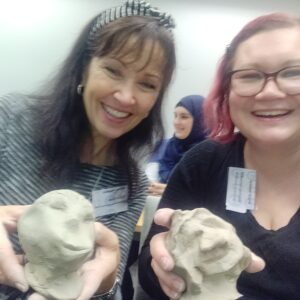
All in all, it was eye-opening to see how different projects are carried out and how different organizations contribute to global citizenship and peace education. We look forward to seeing what Internationality Days offer next year!
Hanna-Mari Koistinen and Elina Ukkonen
-
Balázs and Juan also attended the high schools in Rantakylä and Tulliportti, and it was a great experience for both of them. They organized two different sessions with the students, one on Languages of the World and another one on Winter Tales and Traditions.
The Languages of the World session was taught between October and November 2022. In their presentation, both teachers introduced themselves and their experiences in language learning and living abroad, to continue presenting the language tree concept and other interesting insights on linguistics such as the Sapir-Whorf hypothesis. Then, the students had the opportunity of engaging in a research activity on a pair of similar languages, so that they could explore their similarities. Then, they presented their discoveries to the whole class, improving their presentation skills in English.
The Winter Tales and Traditions presentation followed a similar structure, but the topic included winter traditions in Hungary and Spain (such as the Catalan one of “el Tió de Nadal”) and a research activity on other traditions of the world, including, for instance, those in Italy, Iceland, Bavaria, India, and the Hopi People of Northern Arizona.
Juan Antonio Perez Lopes and Balazs Hergert
-
International Winter Festival Pop Up Day
In December we organized a pop up day at both our schools. The idea of the day was to introduce how Christmas is celebrated and what winter is like around the world by keeping a variety of workshops for pupils. We had five to six workshops.
- USA, Canada and Mexico. Make you own Christmas decoration, pickle on the Christmas Tree or Night of the Radishes decoration by using artificial clay.
- Germany. Christmas word hunt by a class teacher student Saara.
- Spain. Juan’s workshop introduced Spanish Christmas through a powerpoint and a crafts exercise.
- Shakespeare workshop took the pupils on an imaginary trip to the Winter’s Tale and by making a bear mask.
- Travel around the world and learn about Christmas traditions through Thinglink
- At Tulliportti Teacher Training School 9th graders Samuel and Diego Hautamäki gave a presentation on Singaporean school life and holidays and had also created a quiz.
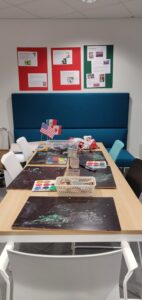
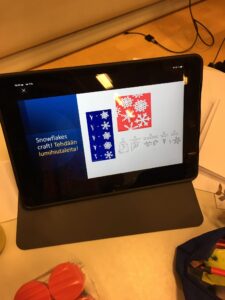
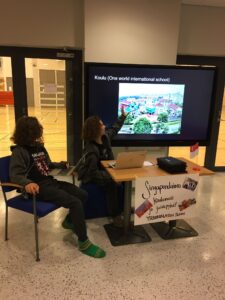
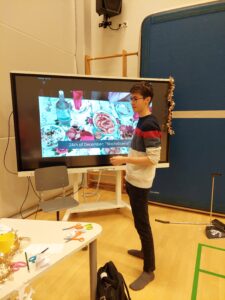
The workshops provided a much-needed break to studying hard during the long fall semester and gave the pupils an opportunity to dive into theme of the different winter traditions and holidays.
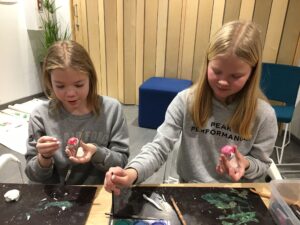
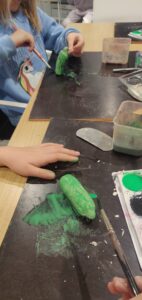
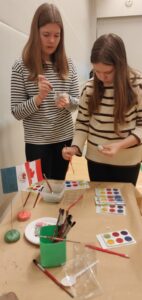
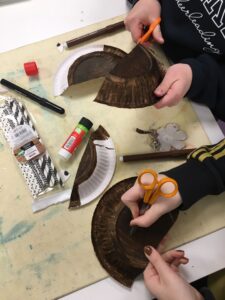
Hanna-Mari Koistinen and Elina Ukkonen
We warmly thank each and every one who took part in this project!
